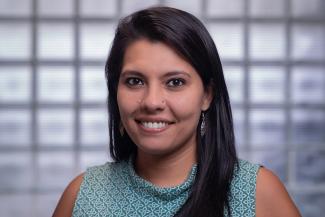Choeeta Chakrabarti

Contact Information
Mondays/Wednesdays: 1:00pm-2:00pm or by appointment
Choeeta Chakrabarti, Ph.D. is a medical anthropologist specializing in the intersection of health, culture and behavior, with a focus on how social organization and health intersect. She holds a Ph.D. in cultural anthropology from the University of Florida (2018), an M.A. in sociology (2010), and a B.S. in biotechnology (2010). Chakrabarti’s research employs mixed-methods approaches to analyze how behavioral factors drive health outcomes at local, national, and global levels.
Her work in part addresses the factors shaping attitudes toward illness and disease. Throughout her career, Chakrabarti has led and collaborated on projects addressing vital issues such as cervical cancer treatment, disaster resilience, and health behaviors during pandemics. As an applied anthropologist, she is a key member of the Florida Health Leadership Academy (funded by the Florida Department of Health), which uses a Community-Based Participatory Approach (CBPR) to guide public health initiatives and train health leaders.
Chakrabarti’s current research focuses on Dalit manual scavengers in India, examining the health outcomes of this caste-based occupation, including the rising rates of alcoholism as a coping mechanism. She is pioneering the use in India of biomarkers to study the impact of caste behavior on health, offering a contextually unique biocultural perspective. Her upcoming project will explore obstetric health issues, specifically examining factors surrounding childbirth experiences and maternal mortality in a cross-cultural, global context.
Relating to her wider interest in the intersection of ideology and social organization, Chakrabarti also investigates ideological spread, focusing on how social networks influence the recruitment and adoption of beliefs. As an educator and mentor, she integrates her research into her teaching, fostering a collaborative and hands-on learning environment for students. Her commitment to culturally informed health policy-making drives her efforts to train the next generation of anthropologists to address real-world health challenges.
Recruiting
Choeeta Chakrabarti is recruiting graduate students interested in mixed-methods research in cultural, bio-cultural and medical anthropology, especially as it relates to health behavior and outcomes.
